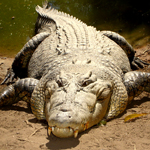Empty forests, empty rivers, empty seas10th January 2016  A recent study published in Conservation Letters highlights forests emptied of wildlife for bush meat trade. A recent study published in Conservation Letters highlights forests emptied of wildlife for bush meat trade.
There has been a long held belief that these animals are mostly being consumed by rural communities. In reality, much of this meat is finding its way to markets and is being eaten by people living in cities.
'Rapid growth of cities and inadequate resources to deter illegal consumption in this urbanized wilderness,' is the crux of the problem, write UK researcher Luke Parry, and Brazilian researchers, Jos Barlow and Heloisa Pereira.
Bush meat is not only an issue for forests. It is also a problem we must tackle for rivers and seas. Wild Migration is deeply concerned about the impacts to sea turtle and crocodile populations in the Indian Ocean and around South East Asia.
The over-exploitation of sea turtles by whalers in the mid- 19th century, the rise in popularity of turtle meat in the United Kingdom and the increased harvesting for turtle leather and shells led to the collapse of numerous sea turtle populations by the late 1900s. Today, all seven species of sea turtles are listed on the IUCN Red List of Endangered Species as either 'endangered' or 'critically endangered'.
In some countries, threatened turtle species have been afforded complete protection by law, while legislation is incomplete or out-dated in others. Nevertheless, even in countries where legislation regulating the harvest and trade of sea turtles exist, most regions are confronted with a large latent market for turtle meat and opportunistic take and illegal turtle trade has been documented. There is also growing evidence that sea turtle consumption may be harmful to human health due to environmental contaminants, biotoxins, parasites, bacteria, and viruses.
We are also concerned about bushmeat hunts for at least three crocodile species in coastal regions of the Indian Ocean: Crocodylus palustris, Crocodylus porosus and Gavialis gangeticus. Crocodilians have been hunted by man for centuries for their meat and skins. The overexploitation of crocodilian species for their skins and meat during the 1950s and 1960s resulted in the decimation of many wild populations. Crocodile meat is still considered a delicacy in regions although the meat is generally consumed as a by-product of the skin trade.
The first session of the United Nations Environment Assembly(UNEA) strengthened the political commitment of the United Nations to addressing illegal trade in wildlife and resulted in the consolidation of the mandate of the United Nations Environment Programme (UNEP) on the issue.
Wild Migration urges UNEA2 to broaden the mandate of UNEP’s work on Illegal Trade in Wildlife to provide serious focus to the severe problems of bushmeat from forest, rivers and seas, from the Arctic to the equator.
|











